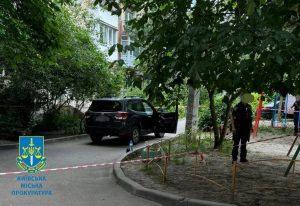Aidos Sadyqov, a Kazakh journalist and noted critic of the Kazakh government, died on July 2 in a hospital in Kyiv, Ukraine, two weeks after being shot outside his apartment in the Ukrainian capital.
Ukrainian authorities identified two suspects, both Kazakh nationals, who Kyiv says fled back to Kazakhstan immediately after shooting Sadyqov in his car. His wife Natalya Sadyqova, who was also in the vehicle, was uninjured.
On July 2, Sadyqova announced her husband’s death in a Facebook post:
Aidos Sadykov left us today at 3:00 a.m. Kyiv time. My beloved husband, the father of our three children, and a great son of the Kazakh people. Aidos gave his life for Kazakhstan; he died a martyr’s death at the hands of killers. For 13 days, Aidos fought for his life in the ICU, but there was no miracle. His death is on [Kazakh President] Tokayev’s conscience.
The Ukrainian Prosecutor-General’s Office said in a statement that following the journalist’s death, they were “working on changing the previous charge of attempted murder into a charge of premeditated murder and group conspiracy to commit murder.”
The Sadyqovs fled to Ukraine in 2014, after Sadyqova came under increasing pressure due to her work with the opposition newspaper Respublika. A parliamentary deputy, Marat Itegulov, filed a lawsuit against Sadyqova, claiming that an article that mentioned his name, which was published under the byline Bakhyt Ilyasova, was actually written by Sadyqova. She was charged with libel, precipitating the couple’s flight from the country. The pair were granted asylum in Ukraine, where they continued their work via a YouTube-based outlet, Base. In October 2023, the Sadyqovs were put on a wanted list by Kazakh authorities for “inciting hatred.”
This brings us to June 18, when a man approached the Sadyqovs while they were sitting in a car outside their Kyiv apartment. Sadyqov was shot in the head.
The following day, Ukrainian law enforcement named two suspects, Kazakh nationals Altai Zhaqanbaev and Meiram Qarataev, who they said had entered Ukraine on June 2 via the Polish border. The pair allegedly rented an apartment, bought a car, and surveilled Sadyqov’s movements until June 18, when one of the men shot him while the other watched. The two then left Ukraine via the Moldovan border that same day.
Zhaqanbaev was arrested on June 22 after turning himself in to Kazakh authorities. Sadyqova alleged that the second suspect, Qarataev, was a police officer in Kazakhstan’s northern Kostanay Region; Kazakhstan’s Interior Ministry issued a statement claiming that Qarataev had been “dismissed from the organs attached to the ministry in January 2019 and currently is not a police officer.”
Kazakhstan’s Prosecutor-General’s Office said it was trying to determine the whereabouts of Qarataev and have not offered an update on that search.
Critically, while Ukrainian authorities say they plan to seek the extradition of the two suspects, Kazakh authorities, most notably the chair of the Senate, Maulen Ashimbaev, have said, “In accordance with the laws of our country, our republic provides priority to the rights of our citizens. Therefore, in such situations, our country, in accordance with the laws, does not extradite Kazakhstani citizens.”
As I wrote in an earlier article:
In 2019, Kazakhstan and Ukraine settled an extradition treaty. While the treaty lays out procedures for extradition of wanted persons in each state, it also provides grounds for refusal of extradition of a country’s own citizens. But in such a case, the treaty obligates Kazakhstan to prosecute the wanted individuals itself or enforce a Ukrainian court’s judgment (assuming one has been arrived at), if requested to do so by Ukraine.
The nuance here is that while the law provides nationality as acceptable grounds for refusal to extradite, it’s not a requirement that Kazakhstan refuse – it’s a right and a choice. Granted, most countries refuse to extradite their own citizens. The Kazakhstan-Ukraine extradition treaty mandates that in making such a refusal, one side can request that the other “subject that person to criminal prosecution or enforce a final judgment of a court of the Requesting Party in accordance with its national legislation.”
Kazakh authorities have committed repeatedly to cooperating with their Ukrainian counterparts. On June 19, Kazakh President Kassym-Jomart Tokayev said he had instructed the country’s diplomatic service and law enforcement agencies “to send official requests to the Ukrainian side regarding this serious incident. If necessary, Kazakhstan’s official agencies are ready to join the investigation to help identify the truth.”
But Kazakh authorities have yet to state clearly that they will pursue charges against the suspects in lieu of extradition.
Meanwhile, although law enforcement has not offered many details on the suspects, journalists at RFE/RL’s Kazakh Service, Radio Azattyq, have culled information from open sources and laid out a troubling picture.
As noted above, Qarataev was a police officer in Kostanay, with the Kazakh Interior Ministry stating that he was dismissed in January 2019. Radio Azattyq checked a phone number presumably belonging to Qarataev via the Getcontact app, which among other things enables a user to find contact names associated with specific numbers. The journalists found the number saved under various titles including “special forces,” “captain,” and “sniper.” It was also saved by several users as “Meiram Arystan.” Arystan is the name of a special forces unit under the National Security Committee of the Republic of Kazakhstan (KNB).
“… it is impossible to claim that Qarataev worked for the KNB based only on the contacts saved in different phones,” Radio Azattyq stressed in its report.
The journalists also searched a number believed to be associated with the other suspect, Altai Zhaqanbaev, and found it saved as “Altai Syrbar KNB” and “Altai KNB,” among other names. Syrbar is the KNB’s foreign intelligence service. Again, the connection of the suspect to the KNB cannot be confirmed with these findings alone, but the carefully planned nature of the assassination certainly suggests the involvement of professionals.

































